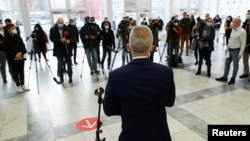The COVID-19 pandemic has had an impact on media globally, with increased censorship and harassment of journalists in many countries, but also a renewed awareness of the importance of reliable reporting, media experts say.
News outlets forced out of business, attacks and threats against journalists, and an “avalanche” of disinformation were cited as some of the main challenges in 2020 for the news industry, during a World Press Freedom Conference panel earlier this month.
“Now more than ever we need news we can trust,” Jesper Højberg, executive director of the Denmark-based nonprofit International Media Support (IMS), said in a video aired as part of the panel. But, Højberg said, the need for reliable information has “reawakened” the public to the “importance of critical, reliable information.”
As some emergency measures started to be used to restrict the media earlier this year, the IMS, which supports local media in countries affected by conflict or insecurity, reached out to its partners for insights on what they were facing.
“We've been very conscious of the importance of fully understanding how COVID-19 has affected, in various different ways, the reality of our partners: media platforms, mainstream and new online media platforms, but also freedom of expression and press freedom organizations,” Højberg told VOA.
The IMS findings showed both good and bad trends for the media, including an increase in audiences and demand for fact-checked information, but also attempts to censor or obstruct critical reporting.
“We have seen authorities blocking webpages that are trying to provide a different information reality,” Højberg said. “And there has been a disruption of channels, radio, online channels that are trying to distribute the reliable information, withdrawal of licenses.”
But, Højberg told VOA, the IMS also saw a gradual increase of trust in media and civil society as citizens looked for information they were unable to get from authorities.
Media survival
Support for the media industry, which has experienced job losses and closures during the pandemic, is part of the focus of a separate project by UNESCO and World Association of News Publishers (WAN-IFRA).
“As the world continues to battle the COVID-19 pandemic and its impact, the decimation of journalism in many areas of the world constitutes a growing threat, bringing existing challenges to a tipping point,” the organizations said in a joint statement.
Guy Berger, director of freedom of expression and media development at UNESCO, told VOA the project is “a response to the challenges to media viability linked to the way that the digital ecosystem has developed and, more urgently, by the COVID-19 pandemic’s impact on local economies.”
The organizations will work together to research challenges for media, discuss solutions and make policy recommendations to countries on how to better support media.
The project covers a range of news outlets, including broadcast, community radio and news websites, and will focus mainly on developing countries in Africa, Latin America and Asia, Berger said.
“We will be looking at the markets, audiences, regulations, as well as the business and journalistic practices of individual media outlets,” Berger said, adding that they plan to have the research completed by the first half of 2021.
“The work will also lead to a series of policy recommendations on best practices for developing the media sector – the conditions and practices necessary for media to thrive so they can continue to fulfill their societal role of providing credible news and information to citizens,” Berger said.
UNESCO will partner with a working group under the Forum on Information & Democracy – an international entity founded by several independent organizations. Several other initiatives are working on the same issue so it made sense to cooperate, Berger said.
“The two groups will inform each other about their work, as well as other stakeholders in the media development community. UNESCO will be an observer at the working group,” he added.
The pandemic has underscored the importance of ensuring the survival of local media.
“I think some of the media that we work with also have gained a completely new sense of purpose,” said Højberg, of the IMS, adding that having independent media during such a crisis is “extremely important.”




